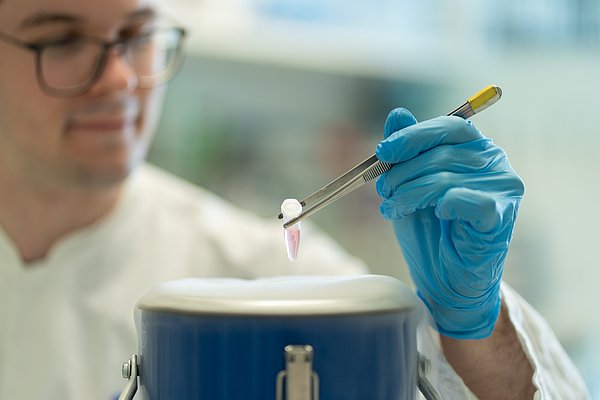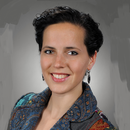The Hopp Children’s Cancer Center Heidelberg (KiTZ) is a joint institution of the German Cancer Research Center (DKFZ), Heidelberg University Hospital (UKHD) and the University of Heidelberg (Uni HD).
"Fight Kids Cancer" (FKC) is a European program supported by non-profit organizations that are committed to fighting childhood cancer and supporting affected families. The five supporting organizations Imagine for Margo (France), KickCancer (Belgium), Fondation Kriibskrank Kanner (Luxembourg), CRIS (Spain) and Kika (the Netherlands) generate donations through charity runs and other fundraising activities. Funding is provided for transnational early clinical studies and clinical research projects that have the potential to sustainably improve the situation of children with cancer. In the 2024 funding round, an international jury of experts has now selected four projects of excellence involving the Hopp Children's Cancer Center Heidelberg (KiTZ) for funding by FKC:
"Due to the comparatively small number of patients, clinical pediatric cancer research can only be successful if many international centers join forces so that young cancer patients can benefit from new findings as quickly as possible. Without programs such as Fight Kids Cancer, large-scale international projects would not be possible. The KiTZ is deeply grateful to all its sponsors, abroad and in Germany for this," emphasizes Stefan Pfister, Director of KiTZ, department leader at DKFZ and pediatric oncologist at UKHD.
The SOUP (Scanning the liquids of paediatric brain tumour patients to personalize treatment) research project aims to develop a reliable, minimally invasive molecular test for brain tumours in children and adolescents, which enables precise examination of the cancer independently of surgery. The international research team, in which a total of 14 centers in seven countries are involved, is analyzing genetic fragments from the cerebrospinal fluid. "A precise diagnosis can support surgeons in planning safe operations and help to plan the most promising therapies during the course of the disease, even if the tumor recurs," says Kendra Maaß, project manager at KiTZ and DKFZ, who is leading the project together with Johannes Gojo from the Medical University of Vienna. The project is funded by FKC with 1,998,000 euros.
The FIGHT4MB project with participating centers in Portugal, Spain and Germany focuses on research into a particularly dangerous form of medulloblastoma, the most common malignant tumor in the central nervous system of children and adolescents. At present, around 40 percent of young people affected by this disease still die. The tumors have been little researched because they could not be "grown" in the laboratory, neither as a cell culture nor in mice. Only recently have the decisive mutations and the cell type that lead to their development been identified, also due to a study at KiTZ. "Building on these results, we now want to grow these tumors in the laboratory to find their weak point," explains Lena Kutscher, head of the working group at KiTZ and DKFZ. The project is being led by Adriana Sánchez-Danés from the Champalimaud Foundation in Portugal and receives funding of 1,678,000 euros.
The European ITCC-BrainTAP program with centers in Austria, the Netherlands, the UK and Germany, led by David Jones, head of department at KiTZ and DKFZ, will receive funding of 2,000,000 euros. As part of BrainTAP, at least 15 new promising therapeutic approaches to combat brain tumors will be systematically tested on patient-specific laboratory models of childhood tumors in order to initiate clinical trials. To develop such tailor-made tumor models, cancer cells from individual young cancer patients are transferred to mice, for example. The patient-specific laboratory models are provided by ITCC-P4 gGmbH, which was recently founded by KiTZ and DKFZ. "There are hardly any modern treatment options for childhood brain tumors because too few clinical trials are initiated. With this project, we want to create the conditions for new drugs to have a chance of being approved for young patients," says David Jones.
The EUROPE project ("Exploring unknown relapse origins in paediatric ependymoma") focuses on ependymomas, the third most common type of malignant brain tumor in children. When ependymomas relapse, the chances of survival for the affected children are low. The EUROPE project, led by Kristian Pajtler, research group leader at KiTZ and DKFZ and senior physician at UKHD, aims to uncover the underlying cellular mechanisms in relapses and identify new weak points in tumor biology through the systematic examination of tumor material. "Through our project, we want to create the conditions for identifying new drugs to help children whose cancer comes back," explains Kristian Pajtler. Many centers from Germany and the Netherlands are involved in EUROPE, which is funded with 878,000 euros. David Ghasemi, physician at the University Medical Center Hamburg-Eppendorf and scientist at KiTZ and Research Institute Children's Cancer Center Hamburg, is responsible for scientific coordination.
"Due to the comparatively small number of patients, clinical pediatric cancer research can only be successful if many international centers join forces so that young cancer patients can benefit from new findings as quickly as possible. Without programs like Fight Kids Cancer, such large-scale international projects would not be possible," emphasizes Stefan Pfister Director at KiTZ, Head of Department at DKFZ and paediatric oncologist at UKHD. "We are very proud that so many of our projects have been selected for funding and would like to thank Fight Kids Cancer for the opportunity to improve the situation of children and young people with cancer in the long term."




